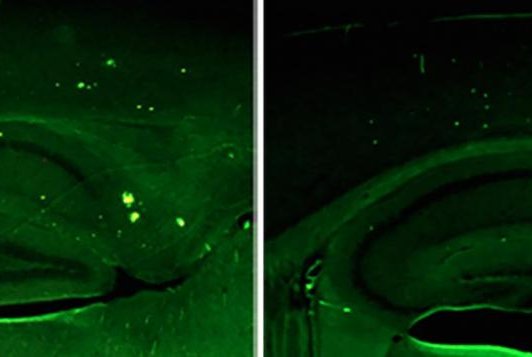In mice with Alzheimer's disease, researchers showed raising levels of neuregulin-1, pictured at right, lowers a marker of disease pathology in a part of the brain that controls memory, compared to mice in an untreated control group, pictured on the left. Photo by the Salk Institute
LA JOLLA, Calif., Aug. 25 (UPI) -- Increasing levels of a protein in the brain appears to decrease symptoms of Alzheimer's disease by preventing the formation of plaques linked to the condition, researchers report.
Researchers at The Salk Institute found increasing levels of neuregulin-1 in the brains of mice with Alzheimer's disease improved their performance on tests of spatial memory and markers for the disease decreased, according to a study published in the journal Scientific Reports.
Neuregulin-1 is a naturally-occurring protein, and is already a potential treatment target for Parkinson's disease, amyotrophic lateral sclerosis and schizophrenia.
The researchers tested the effects of increasing levels of neuregulin-1 based on previous studies showing it lowers levels of amyloid precursor proteins, which generate amyloid beta that aggregates in the brain to form plaques linked to the disease.
The experiments with mice suggest the protein does, in fact, help with the breakdown of amyloid-beta plaque buildups in the brain, potentially allowing neuron signaling to improve, leading to the memory improvements seen in the rodents.
"There's much more work ahead before neuregulin-1 could become a treatment, but we are excited about its potential, possibly in combination with other therapeutics for Alzheimer's disease," Dr. Kuo-Fen Lee, a professor at the Salk Institute, said in a press release.
For the study, researchers raised the level of one of two types of neuregulin-1 in the hippocampi of mice, finding increases in either appear to improve performance on the memory tests. Compared to mice not treated, levels of amyloid beta and plaques were lower in rodents receiving treatment.
Researchers are concerned too much of the protein can harm brain function and are currently testing a method of raising levels of neuregulin-1 already existing in the brain.
Despite the promising results with mice, the researchers caution that neuregulin-1 treatment was tested in just one type of rodent -- and they aren't entirely sure how it works yet.
"Neuregulin-1 has broad therapeutic potential, but mechanistically, we are still learning about how it works," Lee said. "We've shown that it promotes metabolism of the brain plaques that are characteristic of Alzheimer's disease."















